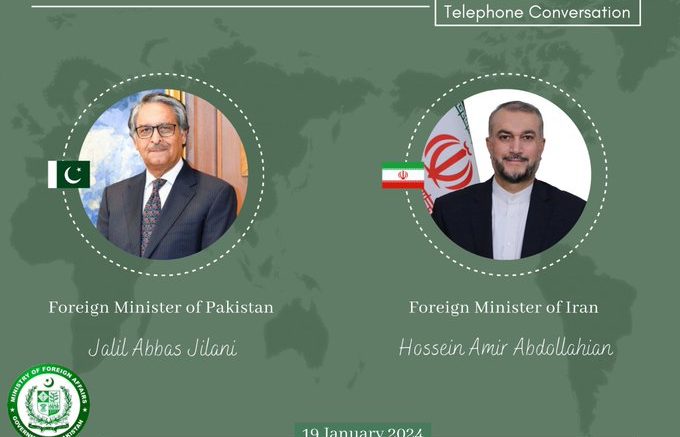ISLAMABAD (HRNW) – Pakistan and Iran on Friday agreed to lower tensions after the neighbours carried out drone and missile strikes on militant bases inside each other’s territory earlier in the week.
Both sides signalled a desire to de-escalate tensions during a telephonic conversation between caretaker Foreign Minister Jalil Abbas Jilani and his Iranian counterpart Hossein Amir Abdollahian, according to Pakistan’s Foreign Office.
FM Jilani expressed Pakistan’s readiness to work with Iran on all issues based on spirit of mutual trust and cooperation. He also underscored the need for closer cooperation on security issues.
Pakistan launched strikes on terrorists’ hideouts inside Iran on Thursday, in a retaliatory attack two days after Tehran violated the country’s sovereignty by firing a missile in Balochistan, resulting in the tragic death of two children and injuries to three girls.
United Nations Secretary-General Antonio Guterres urged the two countries to exercise maximum restraint, with the US and China also appealing for restraint.
The tit-for-tat strikes across the porous border between the two neighbours fueled fears of wider instability in the region since the war between Israel and Hamas erupted on Oct 7.
FM Jilani, during a telephonic conversation with Turkish Foreign Minister Hakan Fidan earlier on Friday, said that Pakistan had no interest or desire for escalation.
Jiani said that Pakistan’s Operation “Marg Bar Sarmachar” was directed at terrorist camps inside Iran.
On Thursday night, the diplomats of Pakistan and Iran also engaged in what Foreign Office spokesperson Mumtaz Zahra Baloch called “some positive exchanges” with both sides stressing for dialogue and restoration of trust.
Iranian Deputy Foreign Minister Seyed Rasoul Mousavi, on social media platform X, shared the statement of the Iranian Foreign Ministry which said, “Iran adheres to the policy of good neighborliness and brotherhood between the two nations and the two governments of the Islamic Republic of Iran and Pakistan.”
The statement also read, “It does not allow enemies to strain the amicable and brotherly relations of Tehran and Islamabad… especially when the genocide and crimes of the Zionist regime are the foremost issues affecting the Islamic world.”
In his translated remarks, Mousavi called his ministry’s statement “the endpoint of the waves of tension between Iran and Pakistan.
“Leaders and high officials of both countries know that only terrorists and enemies of both countries benefit from the existing tension between the two neighboring countries,” he wrote on his personal social media account.
Echoing the Iranian foreign ministry’s statement, Mousavi said, “Today, the main problem of the Islamic world is to stop the Zionist crimes in Gaza.”
Following this, Rahim Hayat Qureshi, Additional Foreign Secretary of Pakistan also took to his personal X account and responded by reciprocating the sentiments of “dear brother Seyed Rasoul Mousavi”.
“Pakistan and Iran have fraternal relations and shall move forward to resolve all issues through positive dialogue,” said Qureshi who had also served as Pakistan’s ambassador in Iran and Permanent Representative to ECO.
He said it was important to restore the trust and confidence that has always defined the Pak-Iran bilateral relations.
“Our common challenges including terrorism require coordinated action,” he commented.
Later, Foreign Office spokesperson Mumtaz Zahra Baloch also commented on her personal X account calling this conversation “some positive exchanges.”
